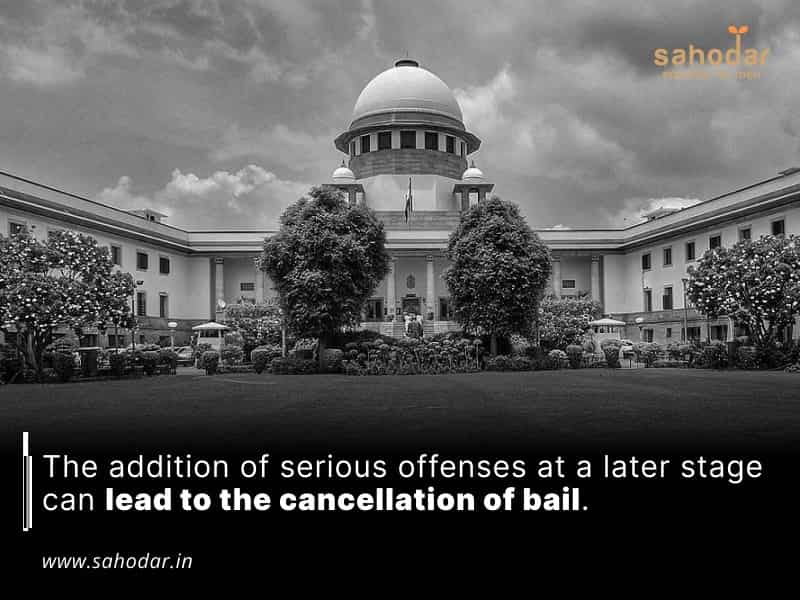The Supreme Court has held that bail may be revoked if serious charges are added to an FIR after it has been granted. In a case before Justices A.S. Bopanna and Hima Kohli, the accused, respondent No.2, was granted anticipatory bail by the Bombay High Court. The appellant, a model, had accused the businessman of promising her modeling work and then sexually assaulting her in a hotel room where she was staying. The appellant challenged the High Court’s decision to grant anticipatory bail to the accused.
The appellant, who is also the complainant, alleged that the police had intentionally excluded a crucial part of her statement from the FIR to benefit the accused. The FIR only contained charges under Sections 354, 354-B, and 506 of the Indian Penal Code. Furthermore, she accused the police of deliberately not taking her for a medical examination, despite her allegation of rape against the accused. The accused was granted interim protection by the High Court, which was challenged by the appellant before a bench comprising Justices A.S. Bopanna and Hima Kohli.
The Supreme Court made reference to the Masroor case, which emphasizes that the granting of bail should not be an automatic process, and the lack of pertinent considerations can result in interference with such an order. Additionally, the bench cited other rulings and determined that if additional cognizable and non-bailable offenses are appended to an FIR after bail has been granted, the accused can surrender and reapply for bail for the new charges. Furthermore, the investigating agency can invoke the relevant provisions of the Cr.P.C. relating to bails and bonds to seek custody of the accused.
The accused/respondent No. 2’s argument that the prosecutrix/appellant had been frequently changing her statement in the supplementary statements was dismissed by the Supreme Court. The court emphasized that even if the supplementary statements were not considered, there was enough prima facie evidence in the FIR to establish an offense under Section 376 of the IPC.
The bench also noted that despite the appellant/prosecutrix filing an intervention application in the respondent No. 2/accused’s anticipatory bail petition before the High Court, she was not given an opportunity to be heard. While the State was present and represented during the proceedings, it was not appropriate for the appellant’s right to be heard to be ignored. Given that in cases like these, the prosecutrix is frequently the sole witness, it was imperative for the High Court to have taken into account the appellant’s plea.
The respondent No. 2/accused’s contention that the appellant/prosecutrix had been changing her statement in the supplementary statements was rejected by the Supreme Court. The court noted that even without considering the supplementary statements, there was enough evidence in the FIR to prove an offence under Section 376 of the IPC.
In addition, the Supreme Court acknowledged the appellant/prosecutrix’s intervention application in the respondent No. 2/accused’s petition for anticipatory bail before the High Court, but was not afforded an opportunity to speak. Despite the presence and representation of the State during the hearing, the appellant’s right to be heard should not have been disregarded. Since the prosecutrix is frequently the only witness in such cases, it was imperative for the High Court to have taken into account the appellant’s plea.
Source: https://lawtrend.in/important-judgment-of-sc-on-bail-cancellation-subsequent-addition-of-serious-offences-in-fir-is-a-ground-for-bail-cancellation/


I was handling this case since beginning. Justice Kohli’s observation is totally biased and wrong. We have pointed out that Victim herself denied for spot panchana and medical very first day. Also victim’s 164 stmt and supplementary statement has variations. Victim herself accepted that due to some political intervention 376 has been added. Victim was heard by her advocate in high court, her advocate apperance can be seen in HC order. Every crucial point has been neglected by Justice Hima Kohli. If victim is neglected by law then do CBI enquiries fot both parties.
There is an urgent need of gender neutral laws in India,else the burden on the courts may never reduce and men and their families would suffer endlessly. Thank you for siding with an innocent male.